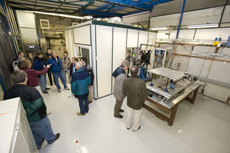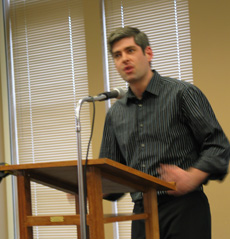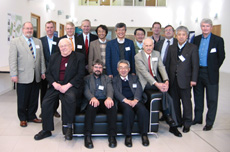|
Fri., January 19
12:30 p.m.
Particle Astrophysics Seminar -
The Dark Side (WH-6W) (NOTE TIME, DATE and LOCATION)
Speaker: A. Dall'Aglio, Astrophysikalisches Institut Potsdam
Title: The Proximity Effect in High Redshift QSOs, Observations
and Simulations
3:30 p.m. Director's Coffee Break - 2nd floor crossover
4:00 p.m. Joint Experimental Theoretical Physics Seminar -
1 West
Speaker: D. Karlen, University of Victoria
Title: ILC Detector R&D Overview
8:00 p.m. Fermilab Lecture Series - Dr. Neil Shubin, University of Chicago,
The First Steps on Land - Auditorium
Tickets: $5
Mon., January 22
2:30 p.m. Particle Astrophysics Seminar - Curia II
Speaker: F. Ferrer, Case Western Reserve University
Title: Indirect Detection of Light Neutralino Dark Matter
3:30 p.m. Director's Coffee Break - 2nd floor crossover
4:00 p.m. All Experimenters' Meeting - Curia II
Special Topic: Tevatron Separator Spark History
Click here for NALCAL,
a weekly calendar with links to additional information. |
Friday, January 19
-Cream of Wild Mushroom
-Blackened Fish Filet Sandwich
-Southern Fried Chicken
-Tuna Casserole
-Assorted Slice Pizza
-Assorted Sub Sandwich
Wilson Hall Cafe Menu |
|
Wednesday, January 24
Lunch
Grilled Salmon Fillet with Scallion Sauce
Winter Vegetable Medley
Mocha Profiteroles
Thursday, January 25
Dinner
Bacon Wrapped Sea Scallops
Ancho Fired Pork Tenderloin
Sweet Potato Stew
Rum Raisin Soufflé
Chez Leon Menu
Call x4598 to make your reservation. |
|
|
The final countdown: Meson Facility set for ILC Test Beam

Erik Ramberg shows off the recently renovated Meson Test Beam
Facility. The facility
and beamline have undergone significant improvements to host the testing of the
latest generation of particle detectors.
At the opening session of the ILC Test Beam Workshop on Wednesday, participants learned how the upgraded Meson Test Beam Facility will keep pace with the high-precision measurements required by the proposed ILC. The upgraded facility is set to be commissioned next week.
So far, most of the specifications for ILC detectors have not been achieved in tests of ILC detector components. Because of this, over 100 researchers from high-energy physics laboratories around the world convened at Fermilab to discuss how to strengthen test beam performance, meet the requirements of the ILC and keep detector research and development on a timescale to coincide with the completion of the ILC accelerator project.
To this end, Fermilab has invested $25 million in the ILC program for personnel, infrastructure, research and development, according to Young-Kee Kim, deputy director of Fermilab. A portion of this investment included a six-month extensive upgrade to the Meson Test Beam Facility, where learning about low-energy collisions will help scientists design better detectors for the ILC. "The key to the next generation of calorimeters is the behavior of low-energy particles," said Erik Ramberg, facility manager for the Meson Test Beam Facility during a facility tour. Until now, the facility was not capable of producing a low-energy (below 4 GeV) pion beam, but upgrades will allow the facility to produce a beam as low as 1GeV. The new facility should also simulate the "pings" of the proposed ILC beam structure: quick bursts of 1 milliseconds of beam followed by 200 milliseconds of blank time. Other improvements include an intermediate moveable target within the beam, minimization of internal beamline interference material, and the ability to better focus beams on the devices under test.
Additional "luxurious" enhancements were made to the researcher space, including the addition of a conference room and a fourth tracking station, and installation of a thorough cable network, motion tables and a high-precision video system.
Ramberg presented the upgraded meson building to an awed tour group Wednesday evening. "It's a piece of work," he said. "Everyone has worked very hard on it. We're really looking forward to turning it on next week."
--Christine Buckley
|
|

Dan Hooper at the Batavia Public Library: Fermilab astrophysicist Dan Hooper spoke during "Books Between Bites" at the Batavia Public Library yesterday. He discussed his book, Dark Cosmos, and answered questions about dark matter, extra dimensions, black holes and how gravity can warp space-time. "Ultimately, the book is really about a question people have asked for thousands of years," said Hooper. "What is everything made of?"
|
Beacon News,
January 18, 2007:
A short time ago, in a galaxy not so far away ... Fermilab worker creating his own 'Star Wars' film
When Star Wars hit theaters in 1977, Darren Crawford was just 10 years old. In fact, he turned 10 that very day -- the first Star Wars film was released on Crawford's birthday, May 25.
"Eleven of us packed into a 1970 Oldsmobile and went to see it," he said. "From that moment on, I've been hooked."
Read More |
|
|
Meeting at Daresbury

The Machine Advisory Committee.
The holiday period has been a busy time for the Global Design Effort. Shortly before Christmas many of us gathered at SLAC to have a first look at the Reference Design Report and its costings with some distinguished external reviewers. Hardly had the New Year arrived when we met again, congregating from around the world to present this information, informed by many useful comments at SLAC, to the Machine Advisory Committee, chaired by Ferdinand Willeke of DESY. The meeting took place at the impressive new building at Daresbury Laboratory near Warrington, UK that houses two separate but intimately related organizations.
--Brian Foster, GDE European Regional Director
Read More |
What is a dry squeeze?
Dear FT:
I have been reading with fascination your daily accelerator status reports
that are on your website. In those reports I often see "operations has placed
the Tev into a dry squeeze."
What is a dry squeeze, exactly, and what is it for?
Thank you for your time,
Jeff Glass, BSEE CSRE
Northern Illinois University
Dear Jeff:
In order to increase the chances that the proton and antiproton beams
collide in the Tevatron as they encounter each other inside the
experiments' detectors, we focus them down to a tiny size. This way,
the particles are more densely packed when we are ready for
collisions to start. The Tevatron does this with special magnets
called "low beta quadrupoles," and the process of focusing is called
the "low beta squeeze."
There are times when we want to do a dry run and have the accelerator
go through the process of making collisions, but without any beam in
the machine. We do this to test the equipment or to make
sure that the magnetic fields are going to be at the proper values.
These magnets have a kind of memory, and behave differently if they
have been turned off recently. Doing this sort of dry run is called a
"dry squeeze." During a dry squeeze, many parameters and readings can
also be checked to make sure everything is functioning properly.
Best Regards,
Todd Johnson, Tevatron operations specialist
|
|
GSA Winter Ball Tonight
The Graduate Student Associate will host a Winter Ball tonight, January 19, from 8 p.m. to midnight at Ida Noyes Hall at the University of Chicago. The ball is free for Fermilab graduate students and their guests. Contact Sarah Schloblohm at sschlobo@nd.edu to sign up.
Fermilab Folk Club Barn Dance
There will be a Fermilab Folk Club Barn Dance Sunday, Jan. 21 at 2 p.m. with music
by Chirps & Friends and calling by Dot Kent. More information.
Flu Shots Still Available in the Medical Office/ WH GF-NW
It is worthwhile to get flu vaccine through the middle of February.
Free flu vaccine shots will be available to all active full-time employees, term
and temporary employees.
Call 840-3232 to schedule an office visit.
Postcard Email Scam
Two lab computers were recently compromised by an email message that contains a link to a "postcard." The so-called postcard is actually a link to an infected file that compromises the machine when the user tries to open it.
To avoid this and other scams, remember:
- Treat email from an unknown source with a high level of suspicion.
- Never open a file unless you are confident about the identity and integrity of the source.
- Have your desktop admin configure your system to run an antivirus check on all files on your system and on files prior to opening.
Classifieds
New classified ads have been posted on Fermilab Today.
Upcoming Activities |
|